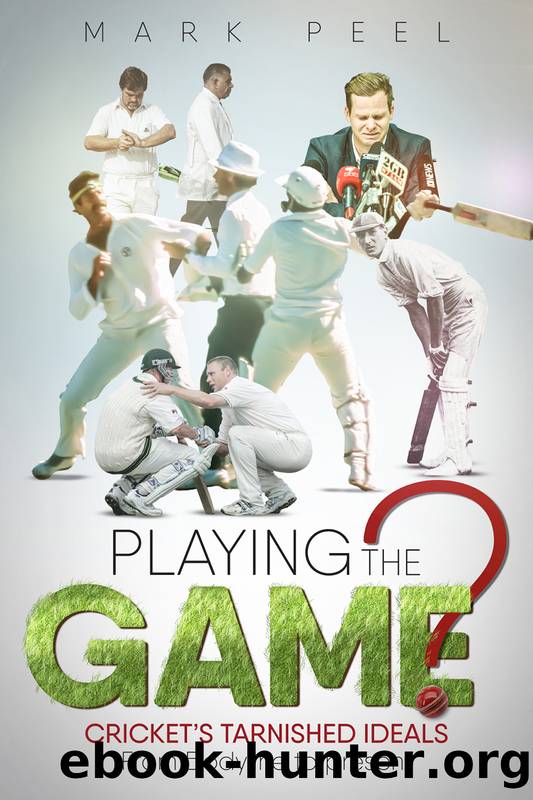Playing the Game?: Cricket's Tarnished Ideals from Bodyline to the Present by Mark Peel

Author:Mark Peel
Language: eng
Format: epub
Publisher: Pitch Publishing
Published: 2018-09-20T00:00:00+00:00
Chapter 10
âUgly Australiansâ
AS West Indian cricket plummeted into steep decline, Australiaâs rose in ascendancy, as they won an unprecedented eight successive Ashes series between 1989 and 2002/03. Figuring that they played their best cricket by adopting a combative approach, they unsettled their opponents at every conceivable opportunity. Such ruthlessness won them few friends, but their growing ascendancy encouraged them to keep pushing the boundaries of acceptable conduct, an approach that others in time sought to emulate.
Although Ashes cricket throughout the 1980s lacked nothing in passion, the matches were generally played in a reasonable spirit, helped by harmonious relations off the field among many of the leading players. As England battled to save the third Test at Headingley in 1981, Ian Botham entertained the whole Australian team to a barbecue at his home. His generosity was reciprocated by Australian captain Kim Hughes and other senior members of his side when they appeared at a dinner dance for Bob Willisâs benefit on the night of their shock defeat in the fourth Test at Edgbaston.
During the Ashes series of 1985, which England won 3â1, Australian captain Allan Border established a close rapport with his opposite number, David Gower, and many of his team. One memorable picture of Gower fiddling with Borderâs bat and chatting amicably with him during a break in play during the Old Trafford Test neatly encapsulated the spirit of that series. âSome, believe it or not, contended that this show of mutual affection illustrated a lamentable dearth of the requisite aggressive spirit expected of Ashes combatants,â commented Gower.130
The goodwill prevailed through Englandâs triumphant tour to Australia in 1986/87, but as Borderâs side began to emerge from the travails of that era, they presented a very different face to their opponents. Stung by criticism from Ian Chappell regarding his cordiality towards the England players, Border returned to England in 1989 a harder, meaner leader. Not only did he end the social pleasantries off the field, he actively encouraged a more intimidating atmosphere on the field of play, a trait that was to continue throughout his time as captain.
Whether referred to as banter, gamesmanship or mental disintegration, aggressive or insulting talk between opponents on the cricket field was nothing new; it could be traced back to W.G. Grace and beyond. Gubby Allen, so often depicted as the gentleman cricketer because of his refusal to bowl bodyline, accused his England colleague R.E.S. Wyatt of being yellow after knocking him senseless in a county match, and Bill Voce threatened Australian opener Vic Richardson with physical intimidation at the beginning of the bodyline tour. Bill OâReilly, the great Australian leg-spinner of the 1930s, used to loudly curse opposing batsmen when the luck went their way, and Bradmanâs relentless run-making made him the object of some barbed comments from frustrated opponents, most notably in the Sheffield Shield.
The renowned Australian cricket commentator Alan McGilvray, when bowling for New South Wales, taunted Bradman, then playing for South Australia, after Bradman had told him he was going to get a big score against him.
Download
This site does not store any files on its server. We only index and link to content provided by other sites. Please contact the content providers to delete copyright contents if any and email us, we'll remove relevant links or contents immediately.
Going Long by Editors of Runner's World(2356)
The Happy Runner by David Roche(2233)
Yoga For Dummies by Georg Feuerstein(1449)
Becoming Boston Strong by Amy Noelle Roe(1383)
Legacy by Kerr James(1290)
Winger by Smith Andrew(1254)
The Little Red Book of Running by Scott Douglas(1201)
Wodehouse At the Wicket by P.G. Wodehouse(1119)
Bowerman and the Men of Oregon by Kenny Moore(1116)
The Way of the Runner by Adharanand Finn(1102)
5050 by Dean Karnazes(1095)
Running Your First Marathon by Andrew Kastor(1069)
Swim, Bike, Run - Eat by Tom Holland(1049)
Blade Runner by Oscar Pistorius(1015)
The Coming Storm by Nigel McCrery(1005)
Spiked (Blocked Book 3) by Jennifer Lane(998)
The Grade Cricketer by Dave Edwards(980)
The Amazing Test Match Crime by Adrian Alington(976)
The Shared Origins of Football, Rugby, and Soccer by Christopher Rowley(973)
